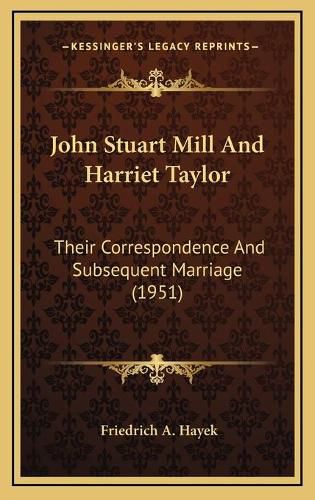Readings Newsletter
Become a Readings Member to make your shopping experience even easier.
Sign in or sign up for free!
You’re not far away from qualifying for FREE standard shipping within Australia
You’ve qualified for FREE standard shipping within Australia
The cart is loading…






John Stuart Mill and Harriet Taylor: Their Correspondence and Subsequent Marriage is a book written by Friedrich A. Hayek and published in 1951. The book is a collection of letters exchanged between the famous philosopher John Stuart Mill and his close friend and later wife, Harriet Taylor. The letters cover a period of over twenty years, from their first meeting in the 1830s to Taylor's death in 1858.The book provides a unique insight into the intellectual and personal relationship between Mill and Taylor. The letters reveal their shared interests in politics, philosophy, and social reform, as well as their deep emotional connection. They also shed light on the social and cultural context of their time, including the debates around women's rights and the role of the state in society.Hayek's introduction to the book provides a historical and biographical context for the letters, as well as an analysis of their significance for the history of ideas. He argues that the correspondence between Mill and Taylor represents a crucial moment in the development of liberal thought, and that their ideas continue to have relevance for contemporary debates.Overall, John Stuart Mill and Harriet Taylor: Their Correspondence and Subsequent Marriage is a valuable resource for anyone interested in the history of ideas, the history of feminism, or the intellectual and personal lives of two of the most important thinkers of the 19th century.This scarce antiquarian book is a facsimile reprint of the old original and may contain some imperfections such as library marks and notations. Because we believe this work is culturally important, we have made it available as part of our commitment for protecting, preserving, and promoting the world's literature in affordable, high quality, modern editions, that are true to their original work.
$9.00 standard shipping within Australia
FREE standard shipping within Australia for orders over $100.00
Express & International shipping calculated at checkout
John Stuart Mill and Harriet Taylor: Their Correspondence and Subsequent Marriage is a book written by Friedrich A. Hayek and published in 1951. The book is a collection of letters exchanged between the famous philosopher John Stuart Mill and his close friend and later wife, Harriet Taylor. The letters cover a period of over twenty years, from their first meeting in the 1830s to Taylor's death in 1858.The book provides a unique insight into the intellectual and personal relationship between Mill and Taylor. The letters reveal their shared interests in politics, philosophy, and social reform, as well as their deep emotional connection. They also shed light on the social and cultural context of their time, including the debates around women's rights and the role of the state in society.Hayek's introduction to the book provides a historical and biographical context for the letters, as well as an analysis of their significance for the history of ideas. He argues that the correspondence between Mill and Taylor represents a crucial moment in the development of liberal thought, and that their ideas continue to have relevance for contemporary debates.Overall, John Stuart Mill and Harriet Taylor: Their Correspondence and Subsequent Marriage is a valuable resource for anyone interested in the history of ideas, the history of feminism, or the intellectual and personal lives of two of the most important thinkers of the 19th century.This scarce antiquarian book is a facsimile reprint of the old original and may contain some imperfections such as library marks and notations. Because we believe this work is culturally important, we have made it available as part of our commitment for protecting, preserving, and promoting the world's literature in affordable, high quality, modern editions, that are true to their original work.